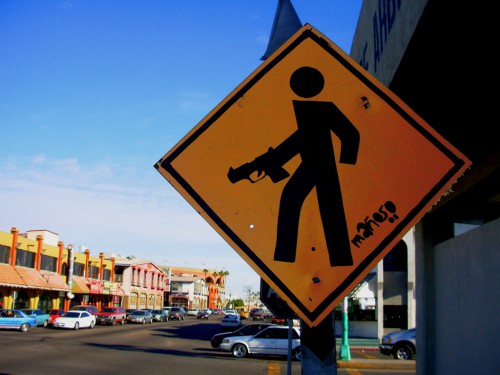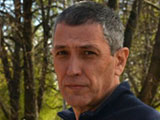Ungovernable for Us: Part One
by Israel Centeno / February 13, 2014 / No comments
The roots of violence in Latin America.

Street sign depicting the prevalence of gun violence in Mexican streets. Photo: mañsk via Flickr.
In order to talk about violence, the expression of natural elements, and the human condition—as I shall do in this series of columns—certain parameters must first be established. I could write numerous paragraphs on the search for the causes of all wars, massacres, and genocides recorded throughout history; on universal outbreaks of war; on the disappearance of stars; on Sodom and Gomorrah, Pompeii, Persepolis, Tenōchtitlān, or Atlantis, but I would not know where to stop.

- From his lonely watch post Albert Camus asked who among us has not experienced exile yet still managed to preserve a spark of fire in their soul. “We’re all alone,” Natalia Sedova cried in exile on hearing of her husband Leon Trotsky’s affair with Frida Kahlo. In his novel Night Watch, Stephen Koch follows the incestuous love affair of David and Harriet, wealthy siblings watching the world from their solitary exile. Koch’s writing, Camus’s theories, and Trotsky’s affair all come back to exile and lead me to reflect on the human condition. From my own vantage point, my Night Watch, I will reflect on my questions of exile, writing, and the human condition.

- Israel Centeno was born in 1958 in Caracas, Venezuela, and currently lives in Pittsburgh as a Writer-in-Residence with City of Asylum/Pittsburgh. He writes both novels and short stories, and also works as an editor and professor of literature. He has published nine books in Venezuela and three in Spain.
The word itself is complex.
It’s vast.
But in search of something measurable, i.e. the scenarios upon which our thoughts could have an influence, we find that such scenarios can be divided up. Thinkers across the ages have focused much of their efforts on trying to understand their societies; the Greeks philosophized their cities and their citizens. Desert tribal leaders followed rules for their wars and turned to the commandments to impose them. We could consider peace to have always followed tribulation and violence. For instance, after the Greco-Persian wars and the main conquests of the empire, there was Greek peace, then Roman peace and, after that, the many other periods of peace that we have known.
Peace is necessary for us to understand ourselves under a system of law. Peace is like order. Order that is structured around specific institutions that legislate and mete out justice; order that is administered either by citizens, a sole leader, or a vertical and indisputable institution, such as the clergy, a party, or the military.
Bearing these considerations in mind, along with a few quotations, the subject of violence in Latin America can be tackled. Though this may be somewhat ambitious.
It is said that Latin America is united by a common tongue and a common history, but, moving beyond that cliché, there is, at the very least, a considerable lack of awareness between her nations. We consider the other countries our relatives, but they’re only distant relatives about whom we know little.
To start, we could note our similarities: Violence unites us. The manner in which we were conquered, the way the vast territory was occupied by the municipal order of town councils, general headquarters, and viceroyalties who sent back reports to a faraway metropolis. The Spanish peace. Independence came next and, as a consequence of the dissolution, disagreement, which was followed by the hegemonic attempts of Gran Colombia and Pan-Americanism to unite the independent Hispanic world as a great nation under single rule—a dream that persists even today. Instead, from the reaffirmation of regional identities sprung numerous republics, overseen in practically all cases by the military. Institutionally weak and constantly threatened by internal and external interests, these new republics were unstable and telluric. It is here that I remember the first paragraph of a masterful story by Roberto Bolaño.
A first paragraph that is a stigma on Latin America.
It is the first paragraph of “El Ojo Silva” (Silva The Eye).
Likewise, similar imagery can be found in Gabriel García Márquez’s novel Cien años de soledad (One Hundred Years of Solitude): The children of colonel Aureliano Buendía are all marked with Ash Wednesday crosses on their foreheads. All are killed.
In Mario Vargas Llosa’s novel La guerra del fin del mundo (The War of the End of the World), a holy man and a messiah known as the Counselor use fanaticism to humanize the marginalized, disowned, anonymous, and ostracized people of the deserted backcountry.
In a letter from General Simon Bolívar addressed to General Juan José Flores, Bolivar, the destroyer of an empire and the inspirer and constructor, to a large extent, of a new reality, announced, bitterly and with an inevitable skepticism, the failure of his endeavor: “America is ungovernable for us.” With this premise, he created a kind of commandment that would tragically condemn the future of the nations that his will, his arm, and his military made possible. Few have paid proper attention to this realistic and human letter, even though many have wasted time on delusions of glory.
With these images, with these constants, I shall continue to reach conclusions regarding violence, primarily in my country, with something approaching coherence, leaving my knowledge and my dynamic and intellectual investigations behind, before going on to consider violence in terms of other fields that are closer to my heart.




